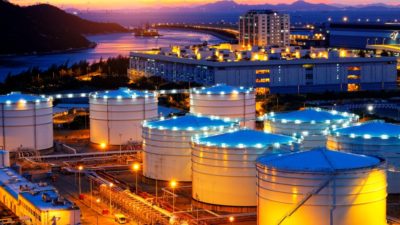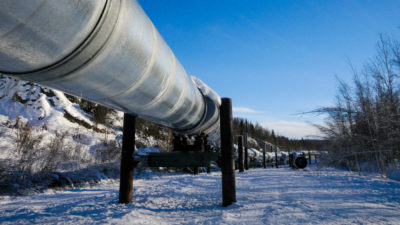When Kinder Morgan Inc. (NYSE:KMI) applied to expand its Trans Mountain pipeline in 2013, it was thought to be a slam dunk for approval. That’s partially because, unlike rival projects such as Enbridge Inc.’s (TSX:ENB)(NYSE:ENB) Northern Gateway and TransCanada Corporation’s (TSX:TRP)(NYSE:TRP) Keystone XL, nearly three-quarters of the route would be pre-existing, meaning it was expected to run into less local opposition.
However, the Trans Mountain pipeline has been a much tougher sell than expected, and this is pushing up the expected costs of this key oil sands pipeline.
A loonie of a price
When Kinder Morgan first proposed the expansion of Trans Mountain, it estimated that the project would cost US$5.4 billion and would nearly triple the pipeline’s capacity from 300,000 to 890,000 barrels per day. The additional capacity was quickly snapped up by producers, with 13 of them signing on to take about 708,000 barrels per day of capacity on the new pipeline.
However, a lot has changed in the two years since the company filed for approval.
Oil prices have been decimated by a worldwide glut of crude, which has slowed the development of new oil projects, with roughly US$60 billion in oil sands projects being deferred since prices collapsed.
Making matters worse, oil sands pipelines have come under intense opposition from environmental groups, leading to the apparent death of TransCanada’s Keystone XL project and significant delays and new conditions for Enbridge’s Northern Gateway and Kinder Morgan’s Trans Mountain.
The delays and additional conditions are adding up and are expected to add significantly to the costs of Kinder Morgan’s project. The company is now estimating that it will cost upwards of $6.8 billion to build the pipeline, and this is partially due to a big dip in the Canadian dollar as well as some changes to the scope of the project.
Why it’s worth the cost
Despite that significant cost inflation, which could be even greater depending on the final conditions on the project, the company continues to press on with the project. The main factor really boils down to economics. The pipeline is expected to still be very lucrative for the company and its customers, even at a higher price.
That’s because it is currently the only west-coast bound oil sands pipeline, and its present capacity of 300,000 barrels per day is routinely filled to capacity, forcing the company to ration capacity to shippers.
Now with competing options growing less likely, and the fact that rail is more expensive and has proven to be quite dangerous when shipping oil, Kinder Morgan’s project represents one of the few hopes of getting more of Canada’s vast oil supplies to market, particularly to the more lucrative Asian markets. Kinder Morgan’s customers are willing to pay dearly for access to the Asian market.
Investor takeaway
Unless it is denied, it appears quite likely that Kinder Morgan will press on with its pipeline expansion because, even at an inflated cost, the economics are still compelling both for the company and its customers.
That’s an important consideration for the company’s investors because while they want a safe project, they only want it built if the economics are compelling. The main focus of pipeline investors is to collect a growing stream of dividends, which won’t happen if the company wastes money on such a large project that doesn’t move the dividend needle.







